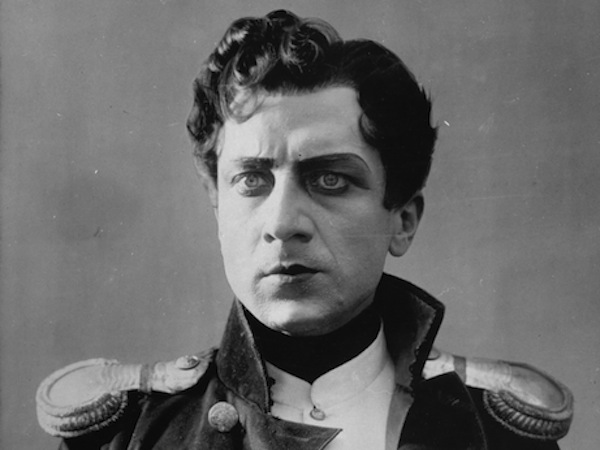
My Life as a Silent Movie
A Novel
Jesse Lee Kercheval
(Break Away Books)

In the first few chapters of this novel we learn that Emma's father died three years earlier (heart attack) and, shortly after, her mother (suicide). Emma's husband and eight-year-old daughter are killed in a car accident, and she finds out for the first time that she herself was an adopted child, and that her true father and mother are probably dead.To say that death runs My Life as a Silent Movie is an understatement. This reader's thought is that it might better have been named My Death as a Silent Movie. The other major theme here --- a rather obscure one --- has to do with a silent-era Russian actor, Ivan Mosjoukine. Mosjoukine was run out of Russia by the Reds, and ended up in France, where he starred in five of what the author (or her somewhat wooden stand-in) calls "classic" movies.
It was, she tells us, his eyes. They were something else again.
It's not odd to build a story around someone so obscure, from so far in the past, but it is odd that it just so happens that Emma's now-deceased husband was a silent-film expert, taught the subject at a midwestern college, and that he knew of Mosjoukine before she started looking for him as her long lost father. Odd, one might say --- and, along with a few other chance occurrences that turn up here --- might be so odd as to be impossible. Especially when the author decides that this actor with the riveting blue eyes is somehow related to our now-bereft Emma. She knows it, she reveals, because "I had someone else's eyes. A stranger's."
I had given this stranger's eyes to my daughter, and she had taken those eyes, that mystery, to the grave. Goddamn it. Who was I? Where had I come from? Where did I belong?
Well, goddamn it, My Life turns into that all-too-familiar Dickensonian drama called "who-am-I?" To get the answer, Emma travels to New York City, Paris, and ultimately, Moscow.
She is befuddled at what she learns and, I must say, this reader is befuddled, and, furthermore bewildered (but not necessarily bewitched). For this novel operates as pure full-bore deus-ex-machina.
With a series of near-miracles, Emma manages to track down her long-lost twin brother in Paris. Some of us are surprised that it comes about so easily. After all, they've only been separated for forty years, had no idea that the other existed.
Sooner or later ... Oh come on ... they journey together to Moscow, to find a 102-year-old holy man who is, yes, Ivan Mosjoukine, their daddykins. He promptly dumps the few hundred pilgrims who are demanding an audience with him ... and he and Emma sit down and have a chit-chat as if they had been old friends just recently out of touch:
"Hello, my dear," he said in Russian-accented French. "Which one are you?" ...
"I'm Anne-Sophie Desnos' daughter."
"Ah," he said, keeping his eyes on mine, not letting me look away. "Little Vera. Did you find your brother?"
"Yes," I said. "He's in Moscow with me, but he wouldn't come. He hasn't forgiven you for leaving."
Mosjoukine laughed softly, his voice a bit hoarse.
Outside of a impossible chance encounters like this one --- and there are a bunch --- there are a couple of nice touches to be found in the novel.
One is: if you are fond of old silent movies, this is a neat reminder of films and characters long lost. Chaplin and Keaton and Laurel and Hardy were lucky ... they remained found. Mosjoukine has mostly disappeared, but Kercheval's take on him makes us curious. His, expression was fierce, "his nose and eyebrows drawn in with dark lines. His character, a prince, becomes a solitary monk..."
In the middle of a long winter night, a divorced woman seeks him out to seduce him. She slithers around his cell, trying to tempt him. To resist her, Father Sergius picks up his ax and, with a swift blow, cuts off his own finger.
Now there's drama, certainly a mind blower for some innocent Parisian who may have dropped in to the cinémathèque there in the Ninth Arrondissement on a dreary Wednesday afternoon.
§ § § My Life as a Silent Movie is thus not throw-away boring ... but improbabilities do take their toll. Especially when we find there at the end, that the ever-spry Mosjoukine has just trotted off with another sweet young thing, despite his staring directly at his 103rd birthday.
I mean, those white Russians were tough. And passionate. And long-lived.
No wimpy Viagra treats for them.
--- Richard Saturday